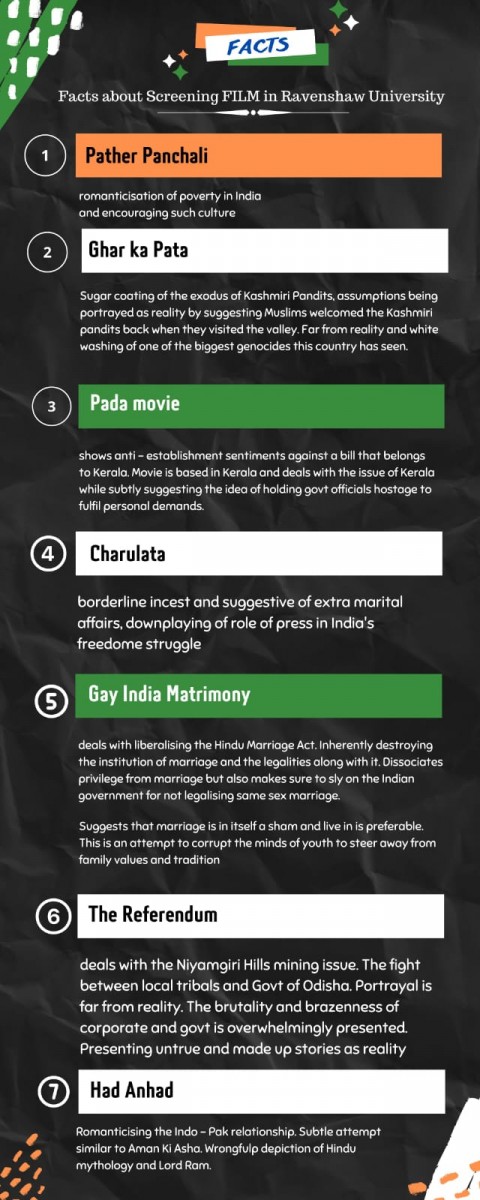
Kolkata: A film festival organised by students of the Ravenshaw University of Cuttack in Odisha was first scrapped and then allowed to take place with two films on the schedule, on queer and spiritual themes, removed after a group of students with alleged rightwing affiliations objected to them.
The Film Society of the centuries-old university, set up in 2018, was to organise its first ever film festival from March 2 to 4. The festival’s line up focused heavily on Satyajit Ray and included his films Pather Panchali, Ganashatru, Charulata and others. Two guests, Jadavpur University film scholar and director Moinak Biswas and the renowned photographer Pablo Bartholomew, were to deliver addresses.
The festival had been greenlit by the university’s Cultural Committee, comprising students and teachers, and Vice-Chancellor Sanjay Nayak, in the middle of February, said film society head Shubha Nayak, a second year post-graduate student of journalism and mass communication.
At 10 am on March 2, Thursday, when film society volunteers and teachers arrived at the campus hall, they were told that the venue was not available. Shubha said they were confused at the caretakers’ missive and went to the V-C’s office to ask for an explanation.
“He said, ‘It is not me who has stopped the festival. Someone else has a problem with it’,” Shubha says. The Wire has not been able to establish contact with the V-C yet and cannot confirm if this was indeed what he said.
The authorities at Ravenshaw University have stopped a film festival that was approved by the administration earlier. The VC has abdicated all responsibility. All this because the ABVP on campus raised objection to two of the films being screened without any explanation. pic.twitter.com/qNzec5V69O
— Abhishek Parija | ଅଭିଷେକ ପରିଜା (@ayy_parija) March 2, 2023
As students sat in protest on the campus, through the grapevine they learned that a fellow student, commerce PhD scholar Chinmay Sahoo, had registered a complaint with the local Malgodown police station, noting that some of the films to be screened were ‘controversial.’
Chairwoman of the Cultural Committee, Professor Urmisree Bedamatta, says the committee had met with the student as early as March 1. The committee acceded to some of the demands, like the plea to cancel the films Gay India Matrimony and Had Anhad, Bedamatta says.
Gay India Matrimony is a 2020 documentary in Bengali by filmmaker Debalina and has been described as a fun take on serious questions on equal rights. Had Anhad was made in 2009, in Hindi, by Shabnam Virmani and tackles spirituality on either side of the India-Pakistan border.
“But when we spoke to the person on the other films they had a problem with, it emerged that his purpose was not to express objection to particular films but to act on what they had already decided – that the screenings couldn’t be allowed. Once we realised that they are semi-literate in films, with no awareness, we did not pay attention to further demands,” said the professor, without naming Sahoo.
Shubha said that the Dean of Students Welfare, Alka Nanda Parida, who is also a member of the Cultural Committee, informed students that among issues that Sahoo had with Ray’s films was a particularly strange one.
“Apparently he had objected to the disrespect to Draupadi in Satyajit Ray’s Pather Panchali. Having never seen the film, he thought ‘Panchali’ in the name was Draupadi,” said Shubha. The Bengali ‘panchali‘ in closer in pronunciation to ‘pnachali’ and means ‘narrative songs’. It is not connected to the Mahabharata.

A still from Satyajit Ray’s ‘Pather Panchali’.
While Parida told The Wire that she would not like to comment on the veracity of this, Bedamatta did agree that such a claim had been made and said that this is why she was calling the person ‘semi-literate in films.’
Bedamatta did not wish to comment on Sahoo or his political affiliation.
Though tweets have claimed that the drive against the film festival is led by ABVP, the RSS’s youth wing, Shubha says that there is a group called ‘Hari Om’, comprising alumni and current students, which is active on campus and has led the stir against the film festival. Hari Om is a group with distinct saffron leanings, but its connection to larger rightwing Hindutva groups is not clear. But Sahoo is not a part of Hari Om, says Shubha, and is learned to have acted in an individual capacity.
As the festival restarted today, Shubha said that Hari Om members had already come to the campus. Earlier in the morning Bedamatta had said that she feared there would be a disturbance. “We have called for police protection,” she said.
The Inspector in-charge of Malgodown Police Station, Rajnikanta Das, said forces were on their way to the campus to ensure peace should anything happen, but did not acknowledge a question on the complaint received.
Hari Om members had been circulating social media posts against the films to be screened for a while now, said Shubha. A particular forward (below) contains a breakdown of which film is objectionable for what reason.

This forward doesn’t have that particular ‘Draupadi’ critique of Pather Panchali, but does feature the film at the top of the list. It accuses it of “romanticisation of poverty in India and encouraging such culture.”
Writers of the pamphlet can probably find solace in the fact that French new wave auteur Francois Truffaut’s criticism of the film, which won big at Cannes in 1956, was along similar lines.
The pamphlet also calls Ray’s Charulata “borderline incest and suggestive of extra marital affairs, downplaying of role of press in India’s freedom struggle (sic)”. In the film, adapted from a Rabindranath Tagore short story, a woman develops warm feelings for her brother-in-law. All characters are lively participants of the printed world.
The forward also contains choice critiques of films on social issues like Ghar ka Pata, an autobiographical film on Kashmiri Pandits, Pada, a Malayalam-language film on tribals’ rights, The Referendum on the Dongria Kondhs’ struggle against mining on the Niyamgiri Hills, and the two films now pushed out of the festival – Gay India Matrimony and Had Anhad.
Gay India Matrimony was made under the aegis of the now defunct but once lively government wing, Films Division. Its maker, Debalina, tells The Wire that she was prepared to go to Cuttack this afternoon until an Instagram post tagging her alerted her to the fact that her film had been scrapped.
When asked about her thoughts on the alacrity with which university authorities who hit back against demands to not screen Ray’s films acquiesced to removing her film from the list, Debalina said that it was a mark of the times we lived in.
“If you see the forward circulated by Hari Om, they’ve actually written the most about my film. It’s clear that they haven’t seen it because even the censor board, while certifying the film, said it’s just inadvisable for minors because it has homosexuality in it. I got an ‘A’ certificate. You see, we have to learn history anew. We can only watch Kashmir Files [a film criticised as propaganda and anti-Muslim but favoured by the ruling BJP]. Or whatever Vivek Agnihotri makes. They’ll decide what we do, entirely,” said Debalina.






